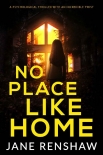No Place Like Home Jane Renshaw (best books to read for beginners TXT) 📖

- Author: Jane Renshaw
Book online «No Place Like Home Jane Renshaw (best books to read for beginners TXT) 📖». Author Jane Renshaw
‘I left it stupidly late to get my train ticket,’ she explained. ‘The only cheap return I could get was coming back on 28 December.’
Not only was she having to deal with the trauma of her boyfriend’s murder, but she was so far away from her family that getting home and back was logistically difficult. He started inviting her to spend time at his own home, but she usually declined the offer.
Just before half term, Bram was standing in the lobby putting on his cycle helmet when he heard Kirsty’s voice. ‘Hi, Mum.’
She must be using the pay phone round the corner.
‘I just thought I should let you know I can’t come home after all – this girl who lives on a farm in Norfolk has asked a group of us to go and stay there. We’re going to be sailing on the Broads and stuff… Yeah. That’s what I thought… I’m sorry, but… Yes, they’re a really nice bunch and it would to be so much fun… And I’ll see you at Easter, so…’
What the…?
Apart from Bram, Kirsty had no friends. Steph’s folks lived on a farm in Norfolk, but there was surely no way she would invite Kirsty there?
And sure enough, at half term Steph disappeared off to Paris and Kirsty went nowhere. She was obviously trying to make out to her family that she was having a ball and had invented a mythical social life. They would presumably be really worried about her, given what had happened, so Kirsty was pretending she was enjoying herself too much to go running back home every holiday.
That half term, Bram was determined that Kirsty would enjoy herself. He took her for a swim in his local pool in Primrose Hill. He showed her London, the tourist stuff like the museums and the galleries and the Tower of London – she loved the ravens – but also lesser known points of interest. Kirsty was particularly intrigued by the Victorian sewer lamp behind the Savoy Hotel, which was still powered by methane from the sewers.
It was the most delicious kind of agony: to spend so much time with her, to talk with her for hours, to sit beside her in the intimate gloom of the cinema and feel they were the only people in the place, so conscious was he of her presence right next to him, of her tiny giggle at a funny line, her caught breath when the baddie suddenly loomed up from the dark, but not even be able to take her hand.
And when he wasn’t with her, he was thinking about her. How to get her to open up to him? They chatted away like old friends, but never about Kirsty herself, never about her past or her home, although she talked about her family a bit, so he knew that her dad was a builder and her mum was involved in counselling people with sight loss, being blind herself from birth. And there was one brother, Fraser, who was a year older than Kirsty. Because she had told him so little, his imagination was free to fill in the gaps, and he spent hours wondering about her, trying to picture her home and her life there.
His course work suffered a bit.
His director of studies asked to see him.
One bright April Saturday he took her to the Hampstead Pergola, a magical, romantically overgrown Edwardian folly where you could stroll along a grand elevated walkway, a bit like an avenue but with vine- and wisteria-covered stone pillars instead of trees, and the structure of the pergola overhead instead of branches; a long, high corridor that turned and turned again, went up and down steps, in and out of little pergola rooms, and all the while you were looking over beautiful gardens to the wooded Heath.
‘Like something from a fairy tale!’ she breathed, walking ahead of him, and then she was running like a child, hair flying, and he was running after her, laughing, slipping, almost falling as he skidded round a corner, desperate not to lose sight of her, his feet pounding on the criss-cross patterns thrown on the flagstones by the shadows of the pergola.
When she came to the end of it, to an open, circular space on top of a little tower, she twirled slowly, arms held out, face shining. And then, to his delight, she caught his hands in hers and twirled him with her, like they were dancing some wild Highland reel.
He pulled her to him and kissed her.
He couldn’t help himself.
For two wonderful seconds, she kissed him back. And then she pulled away, all the laughter gone out of her eyes. ‘I’m sorry, Bram. I’m so sorry. I can’t. I just can’t. I’m sorry.’
And he dropped her hands, and tried to smile. ‘It’s okay. It’s fine. I’m sorry. I didn’t mean to do that. Got a bit carried away there with the romance of it all.’ And he grinned, and swept a hand at the pergola behind them, the gardens, the trees, while inwardly he was cursing himself, terrified, as he’d never been of anything in his life, that she would want to stop this, stop spending time with him. ‘Can we just forget that happened?’
She smiled, and nodded, and he wanted to take her in his arms again and make it right, to take away that terrible pain that was never far beneath the surface, waiting to rise up and engulf her and sweep her away from him.
13
Bram was woken the next morning by a phone call from Ma.
‘Bram, whatever is happening on your





Comments (0)